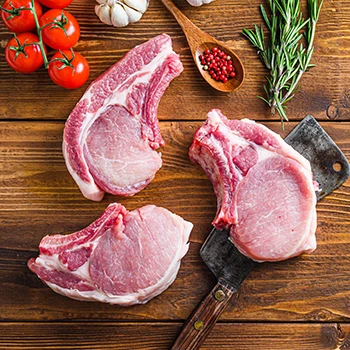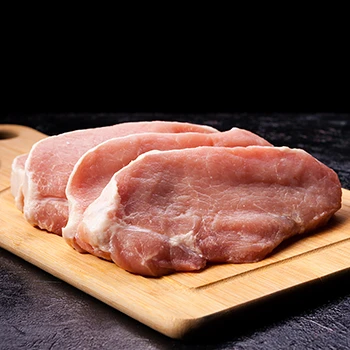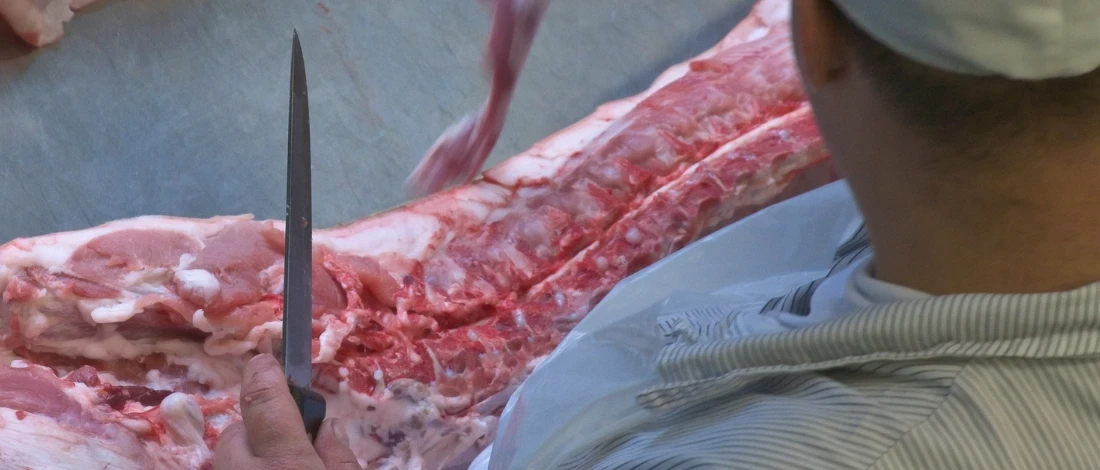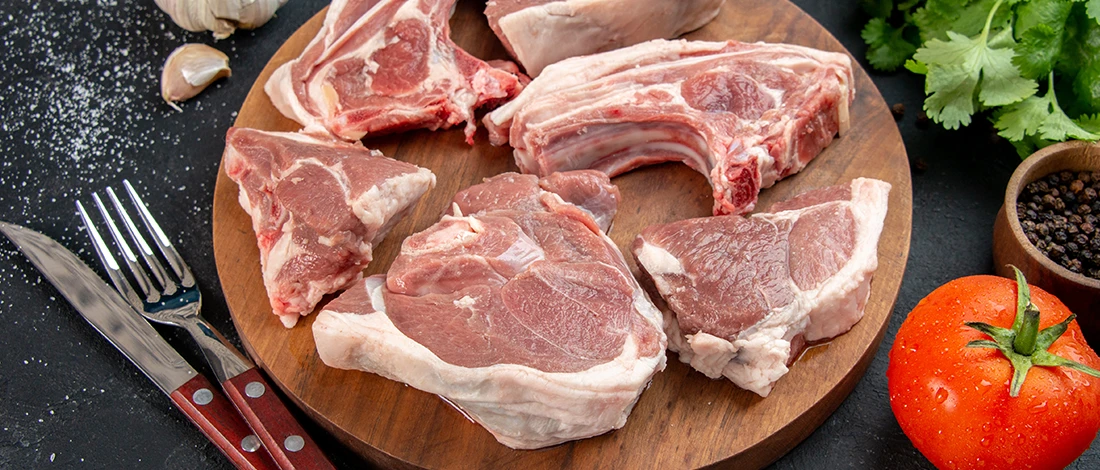As a dedicated carnivore, I love pork and have eaten it for years. But given the wide variation of pork products from tenderloin to bacon, it is reasonable to ask if every type of pork is healthy.
I have researched this topic thoroughly and had a talk with my dietician to see if pork has health benefits I’m otherwise hoping to find in protein-dense food.
Here’s what I found.
Quick Summary
- Pork is generally a healthy, nutrient-rich red meat that can be part of a balanced diet.
- Pork is high in protein, B vitamins, and minerals like iron and zinc.
- You should eat some cuts of pork in moderation due to their high-fat content.
Nutrition Information

It is important to realize that the nutritional value of pork depends on the cut of meat you select. Tenderloin, for example, is a lean cut of pork, while the sausage is not.
However, ground pork is generally representative of the average nutritional profile of pork [1].
A single 100-gram serving of ground pork has the following:
- Calories: 297 kcal
- Protein: 26 g
- Fat: 21 g
- Saturated Fat: 8 g
- Carbs: 0 g
- Fiber: 0 g
1. Vitamins and Minerals
Pork is also a good source of the following essential vitamins and minerals:
- Vitamin B12. This vitamin is involved in many essential functions, including energy metabolism and red blood cell formation [2].
- Vitamin B6. B6 helps the body break down protein, carbohydrates, and fat for energy production. It is also crucial for brain function.
- Niacin. Also called B3, niacin is essential for proper digestion and a healthy cardiovascular and nervous system. Phosphorus. This mineral helps build strong bones and teeth.
- Zinc. Zinc is vital for the immune system, wound healing, blood glucose, and fertility health.
- Selenium. This is an antioxidant that helps to protect cells from damage caused by free radicals.
- Phosphorus. Phosphorus is an essential mineral for building strong bones and teeth.
- Iron. This element helps keep cells healthy and is vital for transporting oxygen in the red blood cells.
- Thiamine. Another name for vitamin B1, thiamine is critical for energy metabolism.
Read more: Best Carnivore Diet Supplements
2. Protein

Like all red meat, pork is an excellent source of complete protein. All the essential amino acids your body needs can be found in pork.
High-quality protein is a crucial element of any healthy diet as it leads to feelings of fullness, boosts metabolism, and helps support strong muscles.
The protein content of pork makes it an excellent option for those looking to build muscle mass or lose weight.
3. Fat
Although high in protein, pork can also be high in fat.
In particular, pork belly and bacon are very fatty and should be eaten in moderation.
However, some lean pork cuts, such as tenderloin, are much healthier.
Additionally, compared to other red meat, pork is relatively low in conjugated linoleic acid (CLA), a fatty acid known to be associated with various health benefits [3].
This makes fatty cuts of pork less healthy than beef or lamb.
Pork and Health

As you can see from reviewing its many nutrients, pork is a healthy and nutritious food. Eating it regularly may offer several potential health benefits.
First, the amount and quality of pork's protein make this red meat a great choice for promoting healthy muscle.
Pork is an excellent option whether you are trying to build muscle or just want to maintain your current muscle mass.
As we age, our bodies become less efficient at maintaining their muscle mass. This phenomenon can become more pronounced if we are sedentary or don't eat enough high-quality proteins.
Eating pork regularly can help counteract this effect and promote healthy muscles as we age.
“Pork tenderloin is actually as lean as chicken breast.”
- Kristi King, Senior Clinical Dietitian Interview for TIME
Pork is also a good source of beta-alanine, creatine, and taurine [4]. These compounds have been linked to improved physical performance and enhanced muscle growth.
In particular, beta-alanine is converted to carnosine in the body. High muscle carnosine concentrations have been found to aid muscle function, reduce fatigue, and increase exercise performance [5].
This means that increasing your pork intake may help improve your muscle performance during workouts.
Finally, pork is high in iron, which is essential for normal energy levels. Iron helps transport oxygen throughout the body and plays a role in immune health.
Eating fresh, lean pork can help ensure you get enough iron for optimal health.
Minimally processed or unprocessed red meat with a high dietary protein level and minimal saturated fat content can all be part of a healthy lifestyle.
Related Articles:
Potential Risks of Pork

Of course, no food is perfect, and pork is not an exception to that rule.
Eating too much pork, especially fatty cuts like bacon or pork belly, can increase your risk of health problems.
- One potential issue is the presence of unhealthy fats in such cuts. Excess consumption of saturated fat can lead to weight gain and chronic illnesses like cardiovascular disease and type 2 diabetes. Therefore, it is vital to limit your consumption of fatty pork cuts and opt for leaner varieties instead.
- Eating raw or fresh pork may expose you to certain parasites. In particular, trichinosis is a type of parasitic infection caused by consuming raw or undercooked pork that has been contaminated with parasitic roundworms called Trichinella.
- A pork tapeworm in raw pork, known as Taenia solium, can also cause a health concern in humans if you do not prepare pork properly [6]. This intestinal parasite can cause a disease called cysticercosis, which may lead to epilepsy. Thus, ensuring that your meat is properly cooked before pork consumption is crucial. Cooking meat to an internal temperature of 160 degrees Fahrenheit will kill the parasite and reduce your risk of infection [7].
- Finally, pork is often a highly processed food. As such, it is one of the meats linked to an increased risk of colorectal cancers. Eating processed meats such as bacon, salami, or hot dogs regularly may increase your risk, so limiting your consumption is best.
- Cured pork products also have a significant amount of sodium and nitrates, which can increase your risk of hypertension and heart problems. Therefore, opt for unprocessed meats whenever possible.
Overall, pork can be a nutritious addition to your healthy diet. As with all foods, moderation is key.
Choose lean cuts, avoid processed meat, and ensure you cook the meat properly before you eat pork.
Doing so will help ensure that you reap all the health benefits that this food has.
FAQs
Is Pork Healthier Than Chicken?
Although, generally, pork is not healthier than chicken, there are specific cuts of pork that are leaner and higher in protein than some cuts of white meat, like chicken. For example, pork tenderloin and some pork chops will have less saturated fats than a chicken thigh with skin.
What Are the Healthiest Cuts of Pork?
The healthiest cuts of pork are lean cuts, such as pork tenderloin, sirloin roast, and center loin chops. These cuts are lower in saturated fats and calories than other cuts of red meat yet still provide plenty of high-quality protein.
What Are the Least Healthy Cuts of Pork?
The least healthy cuts of pork are those that are either high in fat or highly processed. That means that sausage, bacon, ham, and hot dogs are not the best options. Instead, enjoy a moderate intake of unprocessed meat.
References:
- https://www.webmd.com/diet/pork-good-for-you
- https://www.healthline.com/nutrition/foods/pork#vitamins-and-minerals
- https://www.ncbi.nlm.nih.gov/pmc/articles/PMC201014/
- https://www.healthline.com/nutrition/foods/pork
- https://pubmed.ncbi.nlm.nih.gov/17690198/
- https://www.who.int/news-room/fact-sheets/detail/taeniasis-cysticercosis
- https://wyomingwildlife.org/bear-hunting-and-a-case-for-packing-bear-meat/








